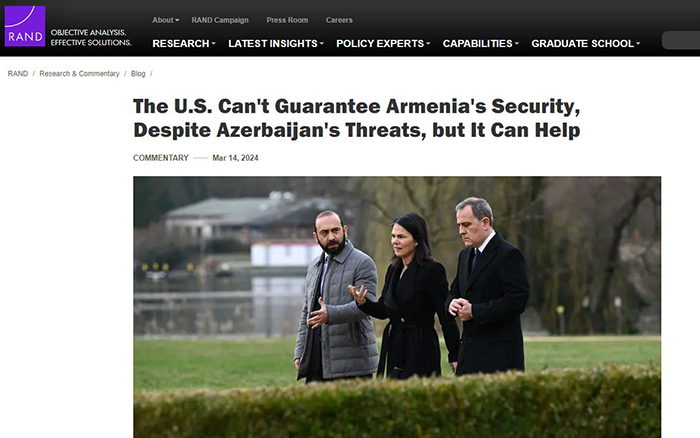[ad_1]
WASHINGTON, DC — The U.S. State Department has pointed to Russia’s “destabilizing actions” in the South Caucasus, responding to analysts from an influential U.S. think-tank who warned Armenia against severing ties with Moscow and fully aligning with the West.
In an article published on March 14, Joe Haberman and Paul Cormarie of the RAND Corporation argued that the United States “cannot play the role of security guarantor” for Armenia even if it decides to supply the latter with some defensive weapons.
“It is thus hardly feasible to fully pivot away from Moscow, which despite its current preoccupation with Ukraine could still impose disastrous costs to Armenia,” they wrote. “Armenia’s national interests would be best served by hedging its security relationship with Russia without unduly alienating Moscow by abandoning it altogether.”
“Yerevan is going to maintain complex economic, social, and strategic relations with its neighbors, including both Russia and Iran, and it would be folly to pressure them to make an all-or-nothing binary choice between a Western alignment or nothing. The West should recognize and accept Armenia’s multi-alignment and focus on areas where it is comparatively able and willing to deepen ties and foster stability,” concluded the RAND analysts.
Commenting on these policy recommendations to the Voice of America on Tuesday, the State Department said the U.S. is expanding its relations with Armenia to support the country’s sovereignty, territorial integrity and “democratic development.” Washington, it said, also welcomes “any bona fide engagement that brings peace and stability to the South Caucasus nations.”
“We have witnessed Russia’s continuing devastating aggression against Ukraine, occupation of Georgia’s sovereign territory and destabilizing actions in the region and around the world. Therefore, we cannot regard Russia as a reliable ally or partner in the South Caucasus or elsewhere,” added the department.
Prime Minister Nikol Pashinyan has pledged to “diversify” Armenia’s foreign and security policy in response to what he sees as Russia’s failure to defend his country against Azerbaijani attacks. Amid mounting tensions with Moscow, he has frozen Armenia’s membership in the Collective Security Treaty Organization (CSTO) and threatened to leave the Russian-led military alliance altogether. Pashinyan and his allies say that closer security ties with the West will help the country better cope with its grave security challenges.
The State Department told the Voice of America that Washington has “consistently encouraged countries in the region to comprehensively assess Iran’s intentions and proceed with caution in all dealings with the Iranian regime.”
[ad_2]
Source link










